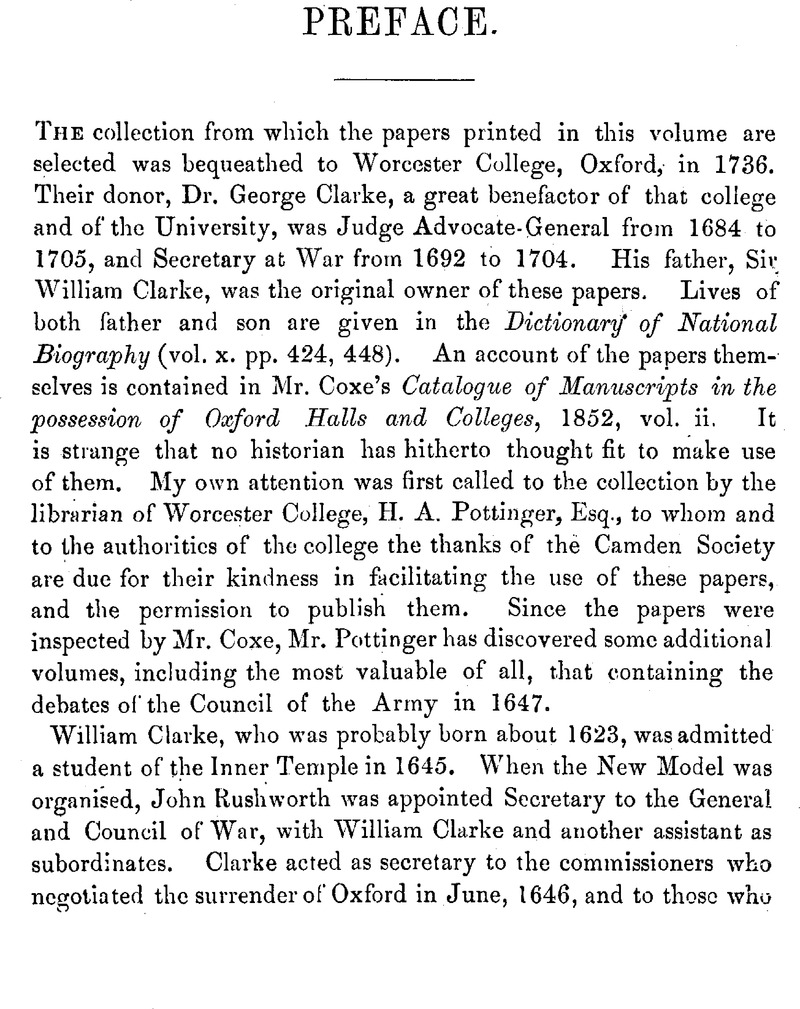No CrossRef data available.
Article contents
Preface
Published online by Cambridge University Press: 24 December 2009
Abstract

- Type
- Preface
- Information
- Copyright
- Copyright © Royal Historical Society 1891
References
Page viii note a Some of his letters from Scotland are amongst the Tanner MSS. in the Bodleian. Cary prints Clarke's accounts of the captures of Stirling and Dundee (Memorials of the Civil War, ii. 327, 367). In August, 1651, he asked for the post of Keeper of the Scotch Records (ibid. p. 332). Other letters of his are printed in the newspapers. See also Old Parliamentary History, xx. 28, 56.
Page ix note a By this marriage Clarke became in some way connected with Gilbert Mabbott, another of: Rushworth's assistants, whose numerous letters in this correspondence testify to their familiarity. Mabbott's son was named Kympton Mabbott.
Page ix note b Egertoa MS., 2618, f. 125. The letter is dated from on board the “Royall Charles,” 8th June, 1666. This volume contains other papers belonging to the collections of Sir William Clarke, including the key to a numerical cypher, dated Sept. 1656 (f. 49). Clarice's diary relating to the events of his last service at sea, April 23-June 1, 1666, is also in the British Museum, Additional MS., 14286.
Page xii note a Book of Army Declarations, pp. 9–11. Compare the comments on page 15 of these papers.
Page xvii note a Pages 85, 100, 105. References in the letters on pp. 83, 86 seem to show that some officers helped the Agitators with money.
Page xviii note a Hudibras, pt. ii. canto ii.
Page xxiii note a Tanner MSS., lviii. f. 129. The Earl of Warwick, Sir Gilbert Gerard, and Sir Harbottle Griniston to the Derby House Committee, June 1, 1647.
Page xxv note a Verney MSS. This passage and the extract from Bellièvre were kindly communicated to me by Mr, Gardiner.
Page xxviii note a Tanner MSS., lviii. f. 123, signed W. B. This letter was read in the House of Commons June 3, and may have had something to do with Cromwell's leaving London. He seems to have left in the company of Hugh Peter.
Page xxix note a The statement that the removal of the King was first determined on in the interview on the evening of June 3 is confirmed by the letters of Lord Montagu of Jane 3 and 4 and his narrative of June 8. (Old Parliamentary History, xv. 393, 396.)
Page xxxii note a A similar manifesto from the Agitators to the soldiers in Wales was issued later (p. 159). In several counties a large party seems to have sided with the Army against the Parliament (pp. 130, 138, 222).
Page xxxiii note a It would not be difficult to estimate the number and fix the names of the officers who separated themselves from the Army at this period. The list given in Sprigge supplies a list of the officers of the New Model in 1646. The engagement of various officers on March 22, 1647, supplemented by the report of the parliamentary commissioners on April 27, gives the names of those who expressed- themselves satisfied with the concessions of Parliament, and undertook to serve in Ireland. (Lords' Journals, vii. 114, 152, 220, 345; Mushworth, vi. 465). In Fortescue's, Lilburn's, Herbert's, and some other regiments, a considerable number of soldiers engaged for Ireland. On the rupture with Parliament in the beginning of June several officers succeeded in bringing off part of their soldiers ; for instance Colonel Greaves (Lords' Journals, vii. 243, 267), Sir Robert Pye (Lords' Journals, vii. 243), Lieut.-Colonel Jackson (Lords' Journals, vii. 243), Captain Farmer (Lords' Journals, vii. 258). Part of Fairfax's lifeguard left him (Lords' Journals, vii. 264, 282). On the other side the names of those who adhered to Fairfax may be gathered from the signatures to the Petition presented April 27 (Rushwmorth, vi. 471), and from the lists of attendances at various councils of war given in the book of Army declarations published in 1647.
Page xxxvi note a Rushworth's text of this Declaration, vol. vi. pp 564–570, differs in some phrases from that printed in the Book of Army Declarations, 1647, pp. 36–46, and the version in the Old Parliamentary History, said to be reprinted from the original Declarations printed at Cambridge, gives two very important paragraphs not contained in either of the others (xv. 466).
Page xliv note a Other accounts of Cromwell's speech are given in the note on p. 230. Mr. Gardiner points out that the speech which Cromwell defends must have been made on September 22nd, as he arrived too late for the debate of the 23rd.
Page liv note a The best account of the rendezvous is given in a letter of William Clarke's, contained in a pamphlet entitled A Full Relation of the Proceedings at the Rendezvous at Corkbush Field in Hartford Parish on Monday last, 1647. It is reprinted by Maseres, Select Tracts, i. lv.
Page lviii note a Insubordination, however, was not yet entirely at an end. On February 23 some of the Lifeguard of Fairfax presented a petition to their General, protesting against the terms on which they were to be disbanded, and backed it by a mutinons demonstration, for which several were tried by a court-martial (Rushworth, vii. 1006, 1009, 1010). A certain William Clarke was condemned to death, but pardoned. Harrison's regiment mutinied when ordered into the west, for which Henry Gethings, an Agitator, and two soldiers were sentenced to death, but also pardoned. Another leading Leveller Corporal Thompson, who had escaped from custody, was arrested by Cromwell himself at the door of the House of Commons, and tried about the same time.(The Kingdom's Weekly Post, March 2–9, 164 7/8; A Vindication of Lieut.-Gen. Cromwell, etc., against a libell signed by one Tompson, by A. C., March 7, 164 7/8.)




